
Arthropod-Plant Interactions
Scope & Guideline
Bridging disciplines to illuminate plant-arthropod dynamics.
Introduction
Aims and Scopes
- Ecological interactions between arthropods and plants:
The journal publishes studies that delve into various interactions, including herbivory, pollination, and mutualism, providing insights into how these relationships influence biodiversity and ecosystem health. - Integrated pest management (IPM) strategies:
Research on innovative pest management techniques that leverage ecological knowledge to mitigate the impact of arthropod pests on crops is a core focus, highlighting sustainable agricultural practices. - Plant defense mechanisms and herbivore adaptations:
The examination of how plants evolve chemical and physical defenses against herbivores, and how arthropods adapt to these defenses, is a significant area of study, shedding light on co-evolutionary processes. - Impact of environmental factors on arthropod behavior and ecology:
Studies addressing how abiotic factors, such as climate change, habitat fragmentation, and urbanization, affect arthropod populations and their interactions with plants are frequently featured. - Role of arthropods in ecosystem services:
Research exploring how arthropods contribute to ecosystem services such as pollination, pest control, and nutrient cycling, underlining their importance in both natural and agricultural ecosystems.
Trending and Emerging
- Climate change impacts on arthropod-plant dynamics:
Increasing attention is being paid to how climate change affects the interactions between arthropods and plants, particularly in terms of altered behavior, distribution, and ecological roles. - Use of technology in ecological research:
The incorporation of advanced technologies such as machine learning, remote sensing, and molecular techniques to study interactions and ecological networks is becoming more common, enabling more sophisticated analyses. - Focus on urban ecology:
Research examining how urbanization affects arthropod-plant interactions is on the rise, highlighting the need for understanding biodiversity in urban settings and its implications for ecosystem services. - Restoration ecology and its implications for arthropod diversity:
Emerging studies are investigating how restoration practices can enhance arthropod diversity and ecosystem functionality, reflecting a growing interest in applying ecological knowledge to restoration efforts. - Functional traits in ecological interactions:
There is a trend towards exploring functional traits of both plants and arthropods to better understand their interactions and the implications for ecosystem processes and services.
Declining or Waning
- Traditional pest control methods:
Research focusing exclusively on chemical pest control methods has seen a decline, likely due to a growing emphasis on integrated and ecological pest management approaches. - Studies on generalist herbivores:
There has been a reduced focus on the impacts of generalist herbivores compared to specialist interactions, possibly reflecting a shift towards understanding more nuanced ecological relationships. - Historical ecological studies:
Research that primarily focuses on historical data without integrating contemporary ecological dynamics has become less prevalent, as the journal emphasizes relevance to current ecological and agricultural challenges.
Similar Journals

TROPICAL ECOLOGY
Illuminating the Path to Sustainable Tropical DevelopmentTropical Ecology is a distinguished journal published by SpringerNature that has been at the forefront of advancing the field of ecology since its inception. With a focus on tropical ecosystems, it addresses critical areas such as conservation biology, systematics, and environmental science. The journal is indexed within leading databases and enjoys a respectable impact factor, ranking in the second quartile (Q2) in Ecology as well as in Plant Science, and third quartile (Q3) in Ecology, Evolution, Behavior and Systematics for 2023. Its insightful research contributions place it among the top-tier publications in Agricultural and Biological Sciences, specifically in rankings such as #185 in Plant Science and #178 in Ecology. While it currently operates under subscription access, it remains an essential resource for researchers, professionals, and students interested in the dynamics of tropical environments, fostering a greater understanding of ecological principles and practices that are pivotal for sustainable development. The journal operates with continuous publication from 1976 to 2024, ensuring timely dissemination of impactful research findings that contribute to the global body of knowledge.

Frontiers in Insect Science
Transforming Insect Studies into Practical SolutionsFrontiers in Insect Science is a pioneering open-access journal dedicated to the advancement of knowledge in the field of insect science. Published by FRONTIERS MEDIA SA in Switzerland, this journal serves as a vital platform for researchers, professionals, and students to disseminate high-quality, peer-reviewed research spanning diverse topics within insect biology, ecology, and pest management. Since its establishment in 2021, the journal has gained recognition, ranking in the Q2 category of Insect Science with a Scopus ranking of #92 out of 181 in the field. With a commitment to promoting open access and collaboration, Frontiers in Insect Science is instrumental in fostering innovative research and practical applications essential for combating biodiversity loss and enhancing agricultural sustainability. As a freely accessible resource, it invites contributions that impact both fundamental and applied insect research, connecting a global network of scholars eager to explore the fascinating world of insects.

Ecological Processes
Shaping the future of ecology with open-access knowledge.Ecological Processes, published by Springer, is a premier open-access journal dedicated to advancing the understanding of ecological modeling and ecological processes. With a significant impact factor evidenced by its prestigious Q1 ranking in both Ecological Modeling and Ecology categories, as well as impressive Scopus rankings—41st out of 461 in Environmental Science and 7th out of 41 in Ecological Modeling—this journal is a vital resource for researchers, professionals, and students alike. Established in 2012 and operating under an open-access framework since its inception, Ecological Processes strives to provide a platform for high-quality research that addresses critical ecological challenges, ensuring wide dissemination of its articles to a global audience. The journal's focus encompasses various aspects of ecological modeling as well as practical implications for managing natural resources, making it an essential publication for anyone interested in the dynamics of ecological systems and their implications for sustainability.
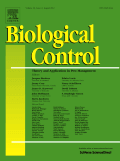
BIOLOGICAL CONTROL
Innovating Biological Strategies for Ecological BalanceBIOLOGICAL CONTROL, published by Academic Press Inc Elsevier Science, is a prestigious journal focusing on the advancement of knowledge in the field of biological pest control and integrated pest management. With a high-impact factor reflecting its significant contributions to agronomy and insect science, it has secured elite positions in both Q1 categories as of 2023. The journal ranks within the top 6% and 12% of its fields on Scopus, making it an essential resource for researchers and professionals dedicated to sustainable agricultural practices and ecological balance. With its comprehensive exploration of theoretical and applied studies from 1991 to 2024, BIOLOGICAL CONTROL serves as a critical platform for disseminating innovative research and promoting dialogue among scholars, students, and practitioners. Although the journal follows a subscription-based access model, it consistently attracts contributions that shape the future of pest management strategies.
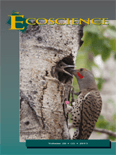
ECOSCIENCE
Uncovering insights in ecology and environmental sustainability.ECOSCIENCE, published by Taylor & Francis Inc, stands as a prominent journal in the fields of Ecology and Environmental Science, recognized for its commitment to advancing knowledge since its inception in 1994. With an ISSN of 1195-6860 and an E-ISSN of 2376-7626, the journal caters to a diverse audience of researchers, professionals, and students passionate about ecological and environmental issues. In 2023, it achieved Q2 and Q3 rankings in the Scopus category of Ecology and Evolution, Behavior and Systematics, reflecting its significance within the academic community. Moreover, ECOSCIENCE occupies notable positions in Scopus rankings, including Rank #324 in Agricultural and Biological Sciences and Rank #210 in Environmental Science, symbolizing its role as a catalyst for disseminating high-quality research. Although currently not open access, the journal's multifaceted scope encourages in-depth discussions on ecological diversity, conservation strategies, and sustainable practices, making it an invaluable resource for those engaged in ecological research and practice.
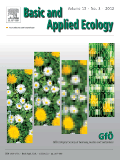
BASIC AND APPLIED ECOLOGY
Elevating the discourse in ecology, evolution, and behavior.BASIC AND APPLIED ECOLOGY, published by Elsevier GmbH in Germany, stands out as a premier journal in the field of ecology, evolution, behavior, and systematics. With its ISSN 1439-1791 and E-ISSN 1618-0089, the journal enjoys a distinguished reputation, evidenced by its classification in the Q1 category for Ecology in 2023 and impressively ranking #89 out of 721 in this domain according to Scopus. Since its inception in 2000, it has served as a vital platform for disseminating high-quality research that bridges theoretical insights and practical applications in ecology. Researchers, professionals, and students alike can look forward to the latest findings that not only foster a deeper understanding of ecological processes but also inform sustainable practices crucial for our environment. As the journal continues its journey through to 2024, it remains committed to advancing ecological knowledge and supporting innovative research in an ever-evolving field.
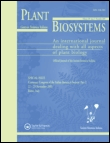
PLANT BIOSYSTEMS
Bridging Knowledge Gaps in Plant Biosystems ResearchPLANT BIOSYSTEMS, published by TAYLOR & FRANCIS LTD, is a leading academic journal dedicated to advancing the understanding of plant systems and their ecological interactions. With an ISSN of 1126-3504 and an E-ISSN of 1724-5575, this journal holds a significant place in the fields of Ecology and Plant Science, earning a Q2 rank in both categories as of 2023. Established in 1993 and continuing robustly through to 2024, it aims to provide a platform for pioneering research that encompasses a wide array of topics, from evolutionary biology to plant-environment interactions. Although not an open-access journal, it maintains a strong reputation, backed by its impressive Scopus rankings—positioned at #179 in Ecology, Evolution, Behavior and Systematics and #138 in Plant Science, placing it within the top percentiles. PLANT BIOSYSTEMS is a vital resource for researchers, professionals, and students who are keen to contribute to and learn from cutting-edge findings in the ever-evolving domain of plant sciences.
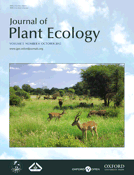
Journal of Plant Ecology
Advancing the Frontiers of Plant EcologyJournal of Plant Ecology, published by Oxford University Press, is a premier journal dedicated to advancing the scientific understanding of plant ecology. With an ISSN of 1752-9921 and an E-ISSN of 1752-993X, this journal has established itself as a leading resource in the field, maintaining a prestigious Q1 ranking across multiple categories in the 2023 Scopus rankings, including Ecology, Evolution, Behavior and Systematics and Plant Science. The journal's commitment to high-quality research is underscored by its influence in agricultural and biological sciences, reflected in its competitive percentiles. While currently not offering open access, its comprehensive scope spans various ecological issues critical to understanding plant interactions and ecosystems, making it an essential read for researchers, educators, and students alike. The Journal of Plant Ecology not only facilitates the dissemination of vital findings but also fosters collaboration within the global scientific community. Discover more about the latest innovative research and key developments in plant ecology, and contribute to the dialogue that shapes our understanding of environmental stewardship and biodiversity conservation.
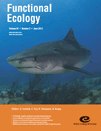
FUNCTIONAL ECOLOGY
Exploring the Intricacies of Nature's InteractionsFUNCTIONAL ECOLOGY is a premier journal published by WILEY that delves into the intricate relationships of organisms and their environments, addressing key themes in ecology, evolution, behavior, and systematics. Established in 1987, this influential publication has made strides in both foundational research and applied science, boasting a remarkable impact factor that positions it in the Q1 category for Ecology, Evolution, Behavior, and Systematics. With a Scopus ranking of #48 out of 721 in its field, it represents the cutting edge of ecological research, appealing to a diverse audience that includes researchers, professionals, and students striving to comprehend and address ecological challenges. Although the journal does not currently provide Open Access options, it remains a vital resource for those looking to deepen their understanding of functional ecology and its practical applications in sustainability and conservation. Join the community of scholars advancing ecological knowledge and its relevance in today's rapidly changing world.
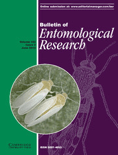
BULLETIN OF ENTOMOLOGICAL RESEARCH
Fostering Interdisciplinary Dialogues in Entomological ResearchBULLETIN OF ENTOMOLOGICAL RESEARCH, published by Cambridge University Press, is a prestigious journal that has been at the forefront of entomological research since its inception in 1910. With an impressive track record extending through to 2024, this journal serves as a vital platform for advancing knowledge in various related fields, notably Agronomy and Crop Science and Insect Science, where it ranks in the top quartile (Q2) and maintains a commendable position within the Scopus rankings in its categories. Notably, its contributions also intersect with Medicine in a broader scope, fostering interdisciplinary insights. While access to the journal content is not classified as 'Open Access,' its rigorous peer-reviewed articles are crucial for researchers, professionals, and students seeking to enhance their understanding of entomology and its applications in agronomy and beyond. The journal's impact is reflected in its notable percentile rankings, emphasizing its relevance and influence in the academic community. Located at the heart of the UK, the BULLETIN OF ENTOMOLOGICAL RESEARCH continues to be an essential resource for those dedicated to the study and understanding of insects and their impacts on agriculture and health.